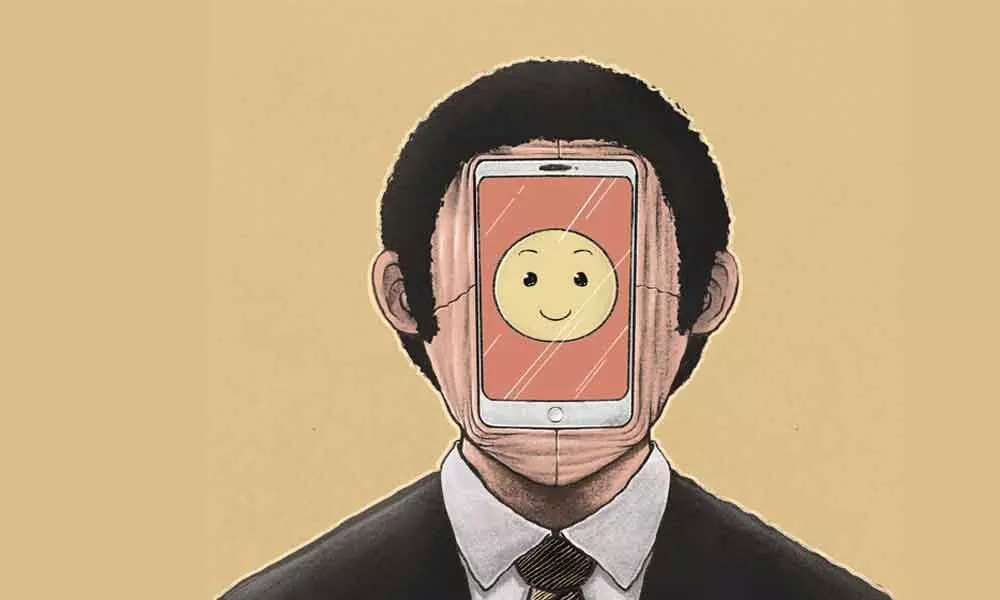Coping with mobile addiction

Coping with mobile addiction
Mobile addiction is a serious problem that many children and their parents face today.
Mobile addiction is a serious problem that many children and their parents face today. It's not just about the child's screen time, but also the amount of time they spend on such devices as smartphones and tablets.
As it turns out, mobile addiction is caused by many different factors. Mobile devices have made life so much simpler. We can do so many different things on our phones nowadays - from booking a taxi to ordering food to voting. The only thing we cannot do on a mobile device is have a face-to-face conversation - that's the only downside! So how could being so attached to our phones be bad for us?
Most of us spend a significant part of our day staring at a screen, whether that's a computer, TV or phone. It's not always easy to disconnect and spend time in the present moment. We can feel like we're missing out on life, or like our lives are out of balance.
When we use social media, for example, it's easy to lose track of what we do. It is no secret that the first cause of our addiction lies in the notifications that smartphones give us when we get new messages or receive updates from social media platforms. When we receive these notifications, it gives us a feeling of anticipation and accomplishment, which can quickly become addictive when it comes to interacting with our smartphones.
Mobile addiction statistics are quite overwhelming! The typical smartphone user touches his or her phone 2,617 times every day. Yes, 2,617 times! Most people, on average, spend 3 hours and 15 minutes on their phones each day. Half of all phone pickups happen within 3 minutes of a previous one.
How to identify mobile addiction?
People who are severely addicted to their mobile phones will be constantly checking their device and browsing through social media or other applications. They can experience feelings of anxiety and unrest if they don't have their phone with them, which is often the case for teenagers who spend a lot of time on social media and other similarly addictive platforms.It can be hard for parents to know if their child is addicted to their mobile device or not. To begin with, start by asking yourself these questions:
Does my child use his/her mobile device…
♦ As a coping mechanism, using it to escape from difficult situations?
♦ As a way to avoid engaging with the people around them?
♦ Excessively during family dinners or gatherings?
♦ Or…do I think that my child would be emotionally devastated if he/she didn't have access to the mobile phone?
Helping our child from the addiction
Today's world is riddled with distractions. Children are exposed to the internet, cellular devices, video games, social media and more. It can feel like there are no safe spaces for children to call their own. There is a lot of evidence proving that limiting time on devices has an impact on mental health and grades in school. Parents should try to limit their children's screen time using different methods. They can set time limits, design healthy boundaries, and get involved with their children's online lives.
Mobile apps and software are being developed to limit the time spent on smartphones. These tools can be set to track how much time is being spent on the phone, restrict access to certain websites, limit the number of messages that can be sent per day, etc.
If the parent feels that the child's mobile usage time is increasing day by day, it is very important to seek some expert's advice in the form of counselling. The role of counselling for the smartphone addicts can be described as a process, which has three major phases: The Pre-Counseling phase, The Counseling Phase and The Post-Counseling Phase. However, the selection of the right expert is also equally important nowadays.
With the increased usage of smartphones, people are developing an addiction to their phone, so much so they can't put it down. The increased use of social media, video games and other apps on the device make it hard for people to control their habits.Mobile addiction impacts our lives in a variety of ways.
It is undeniable that there are advantages smartphones provide such as better means of communication, learning options to users, great exposure to the latest things, ways to personality development, simple ways to access applications, ideas to succeed in business, platforms to grow their applications, and more. But the mobile addiction will lead to peer pressure, cybercrime, affected relationships, social media addiction, fear of missing out, false idolization and expectation, cyberstalking, and difficulty to make friends in real life. It leads to loss of sleep and disliking to eating. It limits the amount of time we spend with loved ones, it prevents us from taking care of our health, and it makes us less productive. Addiction to tech devices increases loneliness and depression.
It has significant impact on students' academic performance. Excessive gadget use is associated with difficulties in cognitive-emotion regulation, impulsivity, impaired cognitive function, addiction to social networking, shyness and low self-esteem. It reduces the quality of our conversations. It impacts one's short-term memory and problem solving. It increases obesity.
Coping Skills
While it may seem that losing yourself online will temporarily make feelings such as loneliness, depression, and boredom evaporate into thin air, it can actually make you feel even worse.Our phones have become an extension of who we are and what we do, but this also means they might be influencing our behaviors in negative ways.Among the most often suggested ideas for mitigating cell phone usage, one can find tips and tricks by simply changing the settings on the phone.
The most common suggested ideas include turning off notifications, setting screen to black-and-white, removing distraction-based apps from the home screen, setting a longer pass-code, using airplane mode, and turning on 'do not disturb. One can even depend on some apps specially built to help us limit our time on our devices. If nothing works better, it is important to seek professional help. However, creating a more balanced attitude towards technology at home won't happen overnight, but there are a number of clear strategies that one can take to help manage the situation.
(The writer is a Guinness, Asia, Limca and India Book Records holder, Journalism Faculty, Author, Corporate Trainer and Life Coach. He can be reached at [email protected])









